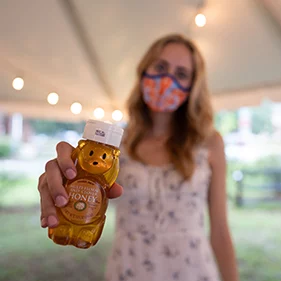Hillels reimagine High Holiday observances amid coronavirus restrictions

For most High Holidays Sophie Koval, 20, would typically join her peers at West Chester University Hillel for a Rosh Hashanah dinner and Yom Kippur break fast meal. She’d attend interactive services, where students come and go between classes to pray, discuss text and ideas. If she wanted to attend services at a synagogue nearby, Hillel would provide transportation.
But this year, ringing in the Jewish new year will be different for everyone including Koval, who will participate in Hillel services online from her hometown of Cheltenham, Pa., because of the coronavirus pandemic.
“For me, community is everything,” said Koval, who is president of WCU Hillel. “Right now, we live in this virtual world where uncertainty surrounds us. To be able to come together with our Hillel friends provides me with a sense of continued support and family.”
WCU Hillel and other Hillels across the country are finding innovative ways to help students celebrate Rosh Hashanah and Yom Kippur with socially distanced activities as well as virtual events.
At Massachusetts Institute of Technology Hillel, executive director Rabbi Michelle Fisher will have a 30-minute window to blow the shofar while adhering to campus coronavirus rules. She has to stay 14 feet away from students, who must stand six feet apart from one another. Everyone will be required to wear a mask.
Each Rosh Hashanah, Rabbi Fisher usually walks around campus and blows the shofar. The tradition has been going on for years, she said.
“Especially in this time, the blasts remind us of another time and what the future can be,” Rabbi Fisher said. “We all know this is not a normal year. I’m trying to help myself, my staff and my students know that we can lean into the unnormal and bring joy and connections.”
University of Texas at Austin Hillel is also offering socially distanced, small group experiences, such as repentance yoga and a gathering at a nearby creek for Tashlich, a custom of casting away sins by throwing breadcrumbs into a moving body of water on the first day of Rosh Hashanah. The organization is still figuring out how to safely add shofar blowing into the program.
“We’re in the business of building relationships,” said Maiya Chard-Yaron, executive director of Texas Hillel. “Hillel is not just about a physical space. It’s about community.”
One challenge many Hillels are facing is providing options that all denominations of practicing Jewish students are comfortable with, said Jeremy Davis, who serves on the University of Delaware Hillel student board as the head of religious life.
UD Hillel is offering separate times to reflect, eat, pray and learn together on Zoom for both Rosh Hashanah and Yom Kippur.
“There is a silver lining: So many things that we used to think weren’t possible to do apart, we’ve found a way,” Davis, 21, said. “Some things are virtual versions of what we normally do. There’s also a lot of new stuff being offered. There’s something for everyone.”
Hillel International is addressing this need for virtual services by partnering with Reboot to offer streamed experiences called Higher Holidays. Jewish college students are given free access to online events featuring Jewish performers, screenwriters and musicians. Some of the guests include the Tony-award winning cast of “The Band’s Visit” and Sarah Hurwitz, the former head speechwriter for Michelle Obama.
Events are offered twice a day in hopes of accommodating different time zones and practices. From a “Supercharged Rosh Hashanah” to an “Uplifting Yom Kippur,” students are able to interact, reflect and pray together while separated physically.
The University of Arizona Hillel is encouraging students to attend these streamed services after picking up their Rosh Hashanah meal kits, which will be given out during a two-hour time block at Hillel. The Hillel will also host a “Coloring and Character Building” event between Rosh Hashanah and Yom Kippur to discuss what makes a person a mensch.
Student leader Rachel Kaplan, 20, said, “I think it’s important to continue to provide community while still showing we can do all the programming without jeopardizing our values.”
Before gathering on Zoom for Rosh Hashanah, Hillel students and staff at Florida State University will hand out apples and honey sticks on campus.
“I think it really shows our perseverance,” said Brandon Gabay, 19, vice president of ritual and Jewish education at FSU Hillel. “It makes me happy knowing that our friends and peers still make time for Hillel and Judaism, even in the midst of such a difficult and different time.”
Monica Sager is part of the inaugural Hillel International Writers Program, a five-month opportunity for Jewish undergraduate students interested in journalism.